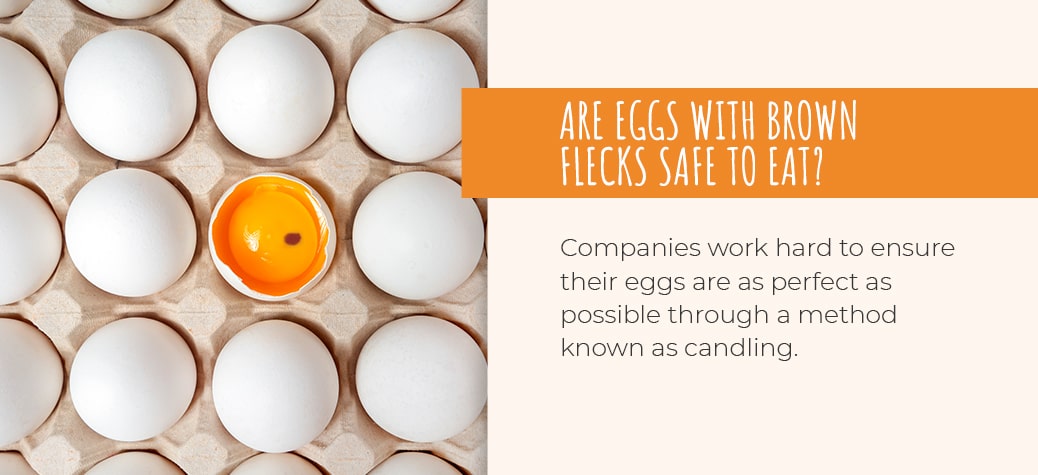What Are Brown Specks in Eggs, and Are They Safe to Eat?
Posted on: November 21st 2022

There’s nothing more satisfying than cracking open a fresh egg, frying it up, and enjoying a comforting breakfast on a Sunday morning. But, a brown spot in your egg could make you wonder if your egg has gone bad. So, do you carry on like normal, or toss it in the garbage?
When it comes to food items, the more information you have, the better equipped you are to make crucial decisions for you and your family — especially with a common item like eggs.
Brown specks found in eggs prove to be quite a controversial topic of debate. Are they good or bad for you? Sauder’s Eggs is a leading wholesale provider of farm fresh eggs, dedicated to supplying families with delicious, all-natural eggs. We have the knowledge and expertise you need to understand what the brown specks in your eggs are and if they’re safe for you to eat.
Let’s take a look!
What Causes Brown Spots in Eggs?
The spots you can sometimes see in eggs can be one of two things — blood or meat spots. These spots are often thought of as flaws and an indication of fertilization, resulting in many throwing them away. In reality, eggs with these brown spots are not fertilized and are formed or picked up as a part of the natural egg-creation process.
Often mistaken for each other, these spots are actually quite different. Let’s take a look at each:
- Meat spots: These are protein deposits found in the white area of an egg, also known as the albumen, that form from pieces of tissue that break off the oviduct’s walls as the egg passes through. You’ll find these spots have brown or off-white coloring.
- Blood spots: These spots are droplets of blood caused by a ruptured blood vessel in the hen’s ovaries or oviduct during the egg-laying process, and you’ll find them in the yolk or the egg white. Blood spots usually have a reddish tint to them.
If you’ve noticed these posts in your eggs, you’re one of the few. In fact, these spots occur in less than 1% of eggs that reach the market. They’re often more prevalent in brown eggs, where it is more difficult to notice them. However, increases in the prevalence of these spots may be caused by a hen’s experience with changing conditions, such as lighting, temperature, and seasons.

Are Eggs With Brown Flecks Safe to Eat?
Many individuals choose to remove these speckles from their eggs based on personal preference. However, there are no signs that these brown speckles pose any threats to your health, and they are completely safe to eat. Whether a blood or meat spot, all you have to do is cook the egg thoroughly and enjoy!
Companies work hard to ensure their eggs are as perfect as possible through a method known as candling. Candling is a process used to check for cracks or internal defects using advanced technology, sound wave sensors, or a bright light source. If a company deems an egg as “defective,” it will then be separated from the good eggs, preventing it from reaching grocery stores.
However, this method isn’t foolproof, and some eggs with these spots do make it to market. For the ones that do make it into your home, eggs with brown spots may actually be fresher than those without them.
As an egg ages, the yolk soaks up water from the albumen, ultimately diluting the brown spot. Store-bought eggs often spend weeks in transportation and stock before entering your home, making the chances of you noticing these brown spots less likely.
What Eggs Most Commonly Have Brown Flecks?
Overall, you’re probably less likely to find these eggs in commercial settings due to thorough quality control procedures and an egg’s aging process. But what eggs will you find these speckles in?
If you shop for eggs straight from a farm, you’ve probably experienced these brown specks in your eggs before. Or, maybe you own chickens yourself and use their eggs in your daily meals. While you and family farms can candle eggs yourselves, it’s usually unnecessary, causing you to come in contact with more eggs with brown spots.
Speaking of candling, eggs with brown shells make the candling process more challenging for egg companies. Since their surface is darker, professionals can miss these brown spots, allowing some to slip through the cracks and end up in your frying pan — about 25% of all brown eggs contain spots. The lighter shells of white eggs make it easy for their spots to be seen, so professionals can then remove them from their packaging before you have a chance to buy them.
Some believe that these eggs with brown spots commonly come from older or younger hens at the end and beginning of their egg-laying cycles, respectively. Others think that heavier chicken breeds are more likely to have these spots occur.
How Can You Cook Eggs With Brown Flecks?
If you’ve found brown spots in your eggs, you might wonder if you need to cook these eggs differently than eggs without them. Well, the answer is pretty straightforward — no! Since these types of eggs are completely safe, there’s no need to cook them any differently than you already know how to.
While there’s no need to remove these little brown splotches, you can always cut them away with a knife if they make you uncomfortable. If you’re fine with them, there’s no need to remove them before bringing your favorite recipes and breakfast dishes to life. To get your creative juices flowing, consider the following ways to cook an egg:
- Scrambled
- Hard Boiled
- Soft Boiled
- Over Easy
- Over Medium
- Over Hard
- Sunny Side Up
- Poached
Shop Farm-Fresh Eggs From Sauder’s Eggs
Finding brown spots in your eggs without knowing what they are can be a little off-putting when making yourself a meal. With the knowledge of what these spots are, what causes them, and which eggs most frequently have them, you’ll be well on your way to enjoying your next dish with the peace of mind and comfort you deserve.
Sauder’s Eggs is a family-owned company you can trust to provide you with the freshest, highest-quality eggs out there. We are now in the fourth generation of ownership since we started in the 1930s. These decades of experience have allowed us to grow our reputation as one of the nation’s top egg wholesalers, focusing on fulfilling our core values each and every day.
Interested in tasting the farm-fresh difference at Sauder’s Eggs? If you are, make sure you check out our store locator to find a retailer local to your area. For more information about our eggs or process, feel free to contact our team online today!

